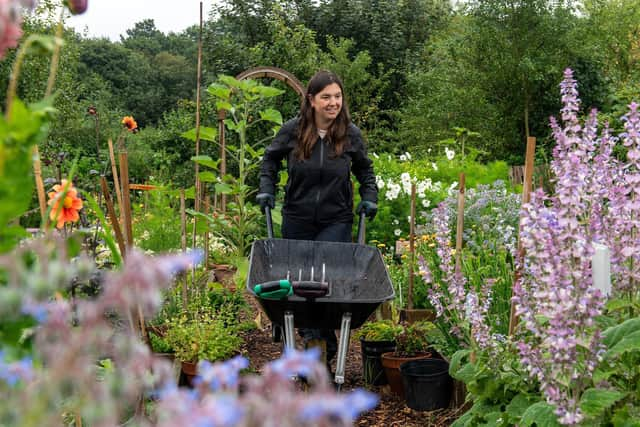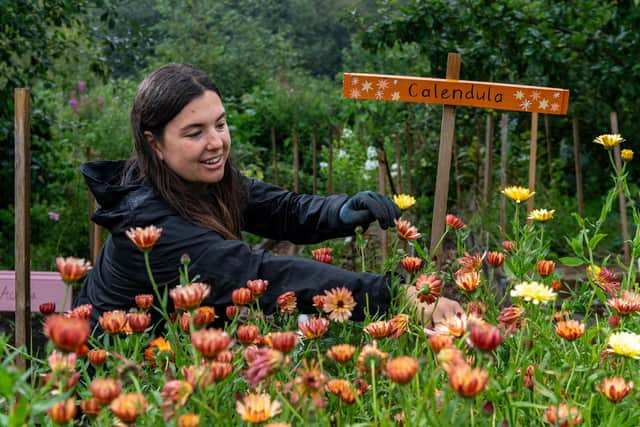Bloom, Sheffield: Therapy through flower growing at unique not-for-profit allotment scheme
The City Council manages over 3,400 allotment plots over eight sites – there’s a huge variation between size and location, and, at the moment, there are two thousand would-be green-fingered folk waiting to be offered a patch to call a second outdoor home. There’s a current occupancy of 96 per cent. Sheffield is not alone, because the pandemic kick-started the ambitions of so many across Yorkshire and the UK generally to get out into the open air, find a refuge, and to “grow your own".
Allotments are rented out to each individual, and there’s an annual budget of just over £300,000. Half of that cash goes to providing amenities (like the essential water supply), upkeep of tracks and repair of fences, and the rest is devoted to staff wages. But it isn’t entirely free of obligations, there are rules and regulations, most of which are just sheer common sense. There are no fires allowed between certain times and dates of the year – you have to wait to burn your rubbish and piles of prunings, for example – and you can’t run your allotment as a commercial outlet. Selling produce on as a profit-making enterprise is forbidden.
Advertisement
Hide AdAdvertisement
Hide AdAcross the UK, allotmenteering began in earnest during the First World War, reached a peak in the Second (when supplies of good food were woefully short), dipped in popularity during the sixties and the supermarket and convenience generation, and then had a resurgence in the seventies and eighties, when popular TV programmes extolled the virtues and pleasures of the “from the veg patch to the table” movement. BBC’s The Good Life had a huge part in promoting the allotment movement.


There are allotment associations, allotment clubs, new friends have been made, friendly rivalries established, and there have probably been proposals and partnerships founded on the size of parsnips, or the proliferation of sweet peas. But there are two allotments in the middle of Sheffield that are very special indeed. They are rented by Bloom, a non-for-profit organisation, founded by Kendall Turner, and they are solely dedicated to the growing of flowers – their plots, in the middle of over four hundred others (it is one of the biggest allotment enterprises in Europe), are situated on a central site, located in a dip in the hilly landscape, and over-looked by three of the city’s tower housing clocks. They are, says Kendall, “a rabbit warren of green”. But Bloom’s patches are devoid of veg of any kind. And that’s for a reason.
Kendall’s initial inspiration for Bloom came when she was working in a high-stress job, as a teacher in a special needs unit. The youngsters were, as she puts it, “extremely challenging”, and growing and gardening became Kendal’s release mechanism from the daily pressures.
Kendal (31) is Nottingham-born, but she came to Yorkshire to study philosophy at Leeds University. “I had the most wonderful time”, she recalls with a big smile, “they were really very happy years, and the course was remarkable – fascinating. But when I finished, I thought a lot about what I wanted to do with my life, and I decided to go into teaching, and while I loved that as well, perhaps I didn’t realise what stamina was needed. Especially when you are teaching special needs youngsters with incredibly complex demands”.
Advertisement
Hide AdAdvertisement
Hide AdShe recalls that her grandfather had been a keen advocate of allotments, and her father as well. “In fact, one of my very first memories – I’d have been about two years old – was going down to dad’s patch, and thoroughly enjoying myself. So, with all the stress that I had, I decided to put my name down for an allotment – this was pre-Covid and the waiting time for your own plot was, back then, all of two weeks! I instantly found it very therapeutic, there was no pressure at all, I could get on with the hoeing and the seeding and the shifting, or I could just sit and think. Or just sit and do nothing at all. Gardening, I found, was wonderful in re-building your mental health – it’s a ‘screen break’ away from everything else, and anyone who works at home, and who can get up, make a cup of tea or coffee, and then have a wander in their garden to dead-head a few flowers, or to have an aimless potter among the plants, will know what I mean. The thing is, however, there are so many people who don’t have access to a garden, nor anything else to escape to, and that’s when I started thinking about how we could extend accessibility to those who truly need it.” The seeds of Bloom, you could say, were planted.


Bloom (which is open to women and non-binary) is now one of Sheffield’s success stories. It has recently expanded, and in addition to its Heeley and Meersbrook plots, it now has a flower shop of the same name on the busy Chesterfield Road in Woodseats, where cut flowers are on sale. Kendall is quick to point out that these blooms and sprays don’t come from the allotments, because Council by-laws prohibit making money from produce, but from a third patch that they have in Dore, on which plants are grown for commercial purposes. It’s a very strict – and non-negotiable – line which is firmly set in stone.
Funding for Bloom is, just as with every small organisation today, a precarious business, and Kendall and her team are constantly exploring new ways of keeping the cash flowing. Comic Relief and the National Lottery have both given assistance. But the idea of selling the flowers from source has proved hugely popular, and, as she says: “What would you rather do? Buy flowers from Israel or Ecuador or somewhere far away, and which have been flown in to the UK at enormous expense, and all of which have left a hefty environmental footprint (they probably have no fragrance at all, because they are forced) or buy something which is scented, and grown just up the road?” She laughs: “Alright, we’ll admit that not all our flowers are on perfectly-shaped stems, many are slightly ‘wonky’, but they have character, they are natural, and they have individual charm, and we never ever use chemicals in pest control, or to promote growth”.
Bloom is constantly exploring new ways to survive, and to keep their vital work in the community alive. They’ve recently started offering creative evenings to hen parties, where the group can find out how to make floral hair accessories and wedding decorations. “It all sounds so very serious”, smiles Kendall, “but there’s a lot of fun to be had, an incredible amount of creativity, and – yes, of course, a few glasses of Prosecco to enjoy!”
Advertisement
Hide AdAdvertisement
Hide AdBloom is divided into two groups. The first is “garden and grow”, where a maximum of ten can book a time to attend the allotments, and the second is through referrals, whether it be from GPs, health-care professionals or by the individual. Bloom has close links with therapists, link workers and community groups. “We encourage everyone to set goals about what they would like to achieve”, says Kendall, “it could be purely social, it could be confidence-building, it could be learning about plants, or it might well be that someone just wants to escape, and be outside. It really doesn’t matter – and neither does age, or abilities. I think our oldest member at the moment is seventy, and the youngest twenty or so. We have women who are care-givers, one with multiple roles, and some who want to escape domestic violence. We are, simply, an outdoor refuge, for those who come to us once, or regularly. There is no judgement, no stress, and no pressure.”
Bloom has been phenomenally successful in establishing links with partners – such as Sheffield’s acclaimed Botanical Gardens – who all firmly support the work that they do. They’re now starting to pop up in local farmer’s markets and other locations, where they can not only market the flowers, but also talk about their work and their ethos to visitors and traders. “It’s a constant, and very big, learning curve”, says Kendall. There have been disasters along the way, as well as successes. This year’s tulip crop was wiped out, so the bulbs were dug up, and replaced by alliums – which bloomed perfectly. And Kendall herself is always looking to expand her horizons and to bring back ideas for the plots. Last year she spent a month in Monet’s garden in France, and says “I have never seen things done so efficiently, and quickly. On one day, we planted over 10,000 wallflower seeds.”
And it also seems that gardening for her and her partner Jonathan (an occupational therapist) truly does begin at home. She admits, with a little embarrassment, that the garden of the house that they lived in for many years was “a terrible wilderness. We rented the property, and we’ve just brought it. So, we’re now finally taming it. A new shed, a new fence. Yes, it’s hard work, but a lot of fun…..and, of course, very therapeutic! Gardening is good for the mind, the soul – and for the planet itself.”
Contact and information: @BloomSheffield
www.bloomsheffield.com